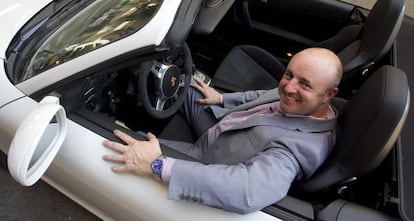The villains' advocate
Jason Coghlan robbed banks in the 1990s armed with a shotgun After doing time, he has become a legal advisor to other British convicts

When they stuck Englishman Jason Coghlan in Alhaurín de la Torre jail in Málaga province his resume included car theft, a string of fights in bars, being thrown out of the Royal Marines, various spells in prison and a long list of bank heists. He was born in the outskirts of Manchester in one of the most depressed areas in Britain and had already become a criminal during his childhood.
His stay in Alhaurín de la Torre, Málaga province, three years ago could have been just another slice of his growing experience of life behind bars. But that was not to be the case. There he met other British prisoners, among other ghettos of different nationalities and races, and he listened to their complaints: the lack of communication with their Spanish lawyers, their scant interest in getting them out of jail, and their obsession with getting paid. There on the Costa del Sol, he found a niche market, a way of living from crime without being a criminal. Now the 43-year-old Coghlan is on the right side of the law after turning himself into a liaison between British prisoners and their local lawyers; a well-regarded advisor whose name is now familiar in Málaga's jails and whom lawyers in the area take seriously.
He makes no attempt to hide his past; that wouldn't make sense when it is so easy to plug his name into a search engine to find out about his dirty deeds. Within the British prison service he was classified as "extremely dangerous." He readily admits now that his time as a "villain" was an "unacceptable" way of life. He ended up in prison in Málaga while facing a charge of extortion on which he was not convicted. But the six months he spent in preventive custody in Alhaurín changed his life. When he learned of his fellow inmates' complaints, he wrote a bunch of letters to lawyers in Marbella who specialize in British prisoners. He explained his situation, the problems facing a foreigner in a Spanish jail, and what in his opinion is a lack of commitment on the part of Spanish attorneys. One of the people he wrote to was Antonio Flores of the Lawbird law firm. "At first we thought he was unhinged, but when he got out of prison, we met up with him and started to take him seriously."
His name is now familiar in Málaga's jails and is one that lawyers respect
Basically, Coghlan secures clients for legal practices, makes sure lawyers don't leave cases in the filing cabinet and assigns who he believes is the best lawyer for each prisoner. He also accompanies lawyers when they visit their clients in jail and attends court cases, although he sits in the public benches. Currently, he has 33 clients working with law firms that specialize in penal, civil and economic crimes.
While he enjoys some spaghetti bolognese in a restaurant in the main avenue in Marbella, with his napkin tucked into his collar, he explains how he became the scourge of British banks in the 1990s. "I saw some guys from Liverpool who always had nice cars. So I asked them where they got the money from and they told me they were bank robbers. That's when I decided that's what I would do."
He started off as the getaway driver but ended up planning the raids himself. The man, dressed in a suit, and always with a smile on his face, cracks joke after joke about his time on the dark side of life and gesticulates a great deal. He was the one who decided when the gang should put their masks on and the one who held the shotgun.
We thought he was unhinged, but we met him and took the idea seriously"
After holding up a series of banks, he was arrested for fighting in a bar. When the police came to his door, he attacked them. When they arrested him, they found he was not only a barroom bruiser but also the criminal they had been trying to track down for several months. "That was when I knew I was looking at a hefty spell in jail and it wasn't a pleasant thought." He got 12 years. "You have to be strong in jail. The best time was at night when they put the lights out because you know that was one day less for freedom," he says in one of the few moments when he speaks seriously.
He has been through the same things as those who need his services; that's why they feel they are speaking to one of their own, villain to villain. For the lawyer Flores, Jason is no mere "novelty." He has found a "gap no one else was filling." The Costa del Sol has always been a favorite haunt of British criminals because of the weather and the lack of communication between Spanish and British police in the 1990s, Flores says.
Hugh Stanley had spent 18 months in limbo in jail having had three different lawyers who were only interested in getting money out of him. A former fellow inmate suggested Coghlan's name; he called him, they met, and in less than six months he was free. "He knows where we're coming from; he's not like one of these lawyers that have never been out of the office," Stanley says. He currently works with Coghlan but doesn't say exactly what he does. In fact, he doesn't want to say much about his life other than the reason he was in jail in Málaga was for laundering six million pounds (7.1 million euros). He spares himself Coghlan's affability.
These guys from Liverpool always had nice cars; they were bank robbers"
"Jason is very sociable. He ends up knowing everybody; that's why they call him a lot. That's his trump card; in prisons it works by word of mouth," says Flores. Coghlan's business is growing and he plans to open an office in Southeast Asia, where he has just spent six months. "The last place you want to be in jail is in Thailand or the Philippines," he explains.
Coghlan knows all about the downsides of jail. His record includes one escape attempt when they were transferring him from his cell to courts. He managed to get hold of some crutches by feigning an injury, then used them as a weapon to force his way out of the courtroom and left by a side door where a friend was waiting for him outside in a car. He spent the following two nights in a striptease joint before he was arrested again.
"Spain gave me the opportunity to change, to have a legitimate business of any sort would have been impossible in my country," the former bank robber says. However, some things remain the same. He still drives a around Marbella in a BMW or a Porsche. "Some habits are hard to break," he jokes.
Tu suscripción se está usando en otro dispositivo
¿Quieres añadir otro usuario a tu suscripción?
Si continúas leyendo en este dispositivo, no se podrá leer en el otro.
FlechaTu suscripción se está usando en otro dispositivo y solo puedes acceder a EL PAÍS desde un dispositivo a la vez.
Si quieres compartir tu cuenta, cambia tu suscripción a la modalidad Premium, así podrás añadir otro usuario. Cada uno accederá con su propia cuenta de email, lo que os permitirá personalizar vuestra experiencia en EL PAÍS.
¿Tienes una suscripción de empresa? Accede aquí para contratar más cuentas.
En el caso de no saber quién está usando tu cuenta, te recomendamos cambiar tu contraseña aquí.
Si decides continuar compartiendo tu cuenta, este mensaje se mostrará en tu dispositivo y en el de la otra persona que está usando tu cuenta de forma indefinida, afectando a tu experiencia de lectura. Puedes consultar aquí los términos y condiciones de la suscripción digital.









































